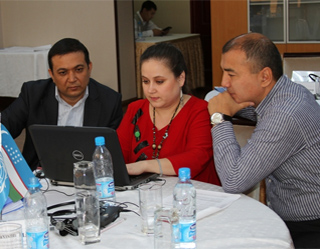
UNDP trained Uzbek researchers on evidence-based policy option paper writing methodologies
This is explained by the fact that policy-making through fusion of primary and secondary data, contrary to ideology-based policy-making, is based on systematic approach of comprehensive analysis of the problem. The practice of developed countries proved that evidence-based policy actions on social and economic issues provide more positive final results, since the decision making process is based on real facts, accurate calculations and offers to the decision makers not one, but several possible policy options.
The main objective of the four-day long training for experts of research institutes was to equip them with skills and techniques, needed in writing evidence-based policy options, as well as with instructions on developing a detailed strategic document. The participants were familiarized with the concept of evidence-based policy, usage of evidence and research methods in policy-making. Moreover they learned how to identify the target audience and stakeholders in decision making, to write and develop documents with several policy options, as well as to analyze possible consequences that stem from taking policy actions.
The trainees thoroughly considered the main components and structures of evidence-based policy options that include the executive summary, description of the issue, indentifying the basic data, statement of policy options, analysis of options and their impacts, recommendations and reference list.
The training sessions were interactive and were conducted through open exchange of views and discussions in small groups of 5-6 people. Along with the theoretical basis, participants had an opportunity to independently take part in writing documents, which embodies the process of preparing evidence-based policy option papers based on the gained skills. “The current training was very useful for representatives of research institutes, since it allowed to gain concrete skills on developing documents for policy-making with various options for problem solution”, noted Mrs. Nargiza Alimova, senior research officer of the Institute for Social Studies under the Cabinet of Ministers of the Republic of Uzbekistan.
At the end of the training, each group presented its own policy document, developed with evidence-based policy options for broad discussion among all participants.
The training was led by an international expert from Canada Mr. Gregory Cran, who has a profound work experience in developing complex analytic and political documents and parliamentary development.
The training was conducted in Russian and English, and was attended by more than 30 experts of various research institutes of Uzbekistan, including the Institute for Monitoring of Acting Legislation, Academy of Public Administration, Institute for Forecasting and Macroeconomic Research, Institute for Social Studies, UNDP and its projects.